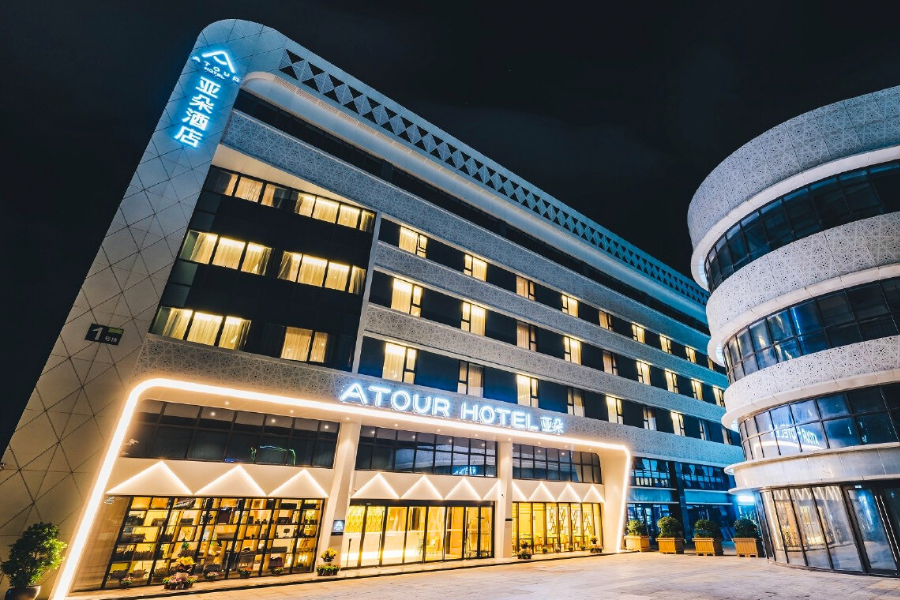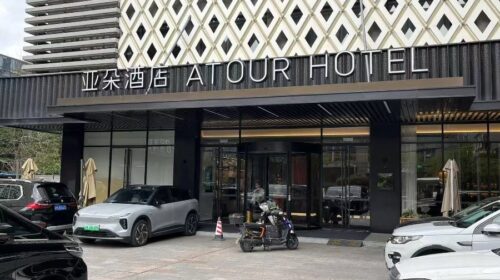Atour shines on tourism rebound, but ‘revenge travel’ likely to be fleeting

The hotel operator’s revenue per available room (revpar) rose above pre-pandemic levels in the first quarter, but the figure is likely to soften through the rest of the year
Key Takeaways:
- Atour reported its revenue rose 71% in the first quarter, as its revenue per available room (revpar) exceeded pre-pandemic levels from 2019
- The sharp gains are likely to taper off in the rest of the year as the effects of ‘revenge spending’ start to fade
By Doug Young
China’s tourism rebound has been the highlight for most companies from the sector in the first quarter, lifting everyone from hotel operators to airlines as Chinese return to the road with the lifting of Covid restrictions. But the biggest star of hotel operator Atour Lifestyle Holdings Ltd.’s (ATAT.US) latest quarterly report has been its relatively unique retail business component that provides a significant portion of the company’s revenues by selling products to travelers through in-room promotions.
That element of Atour’s sales more than doubled in the first quarter to 140 million yuan ($20 million) from 67 million yuan a year earlier, accounting for 18% of total revenue. The gain far outpaced a 71% rise in Atour’s overall first-quarter revenue, which was also quite impressive as Chinese tourists and business travelers began traveling again following the end of pandemic restrictions last December.
Atour’s overall numbers are largely in line with what we’ve seen so far for other travel-related sectors, which are all bouncing back sharply. The big question now is whether those strong gains are one-off “revenge travel” that will quickly fade, or whether they will be sustainable over the longer term.
Investors and analysts both seem to believe the big gains will be temporary. Atour’s stock fell nearly 6% after the results came out, wiping out all of their modest gains for this year. At its latest close of $18.20, the American depositary shares (ADSs) are still 65% ahead of the price from their IPO last November. Still, the stock has lost about a third of its value from a post IPO-high in January.
We’ll review Atour’s first quarter data in more detail shortly, including the impressive numbers for its unique retail sales component we mentioned at the top. But to get a sense of how the rest of the year might go, including whether the revenge spending will fade, we can look to U.S. giant Marriott International (MAR.US), which experienced its own spending bump about a year earlier as the west ended most of its Covid restrictions.
Marriott reported its revenue per available room (revpar), one of the most widely used indicators for the hotel industry, rose 34% in this year’s first quarter, with strong growth from China contributing to that figure. Its core U.S. revpar was up by a more modest 26%. Both of those figures were a fraction of the nearly 100% revpar growth the company logged in the first quarter of 2022 when Covid restrictions were first being lifted in the west.
Analysts also believe the revenge spending phenomenon will be fleeting in China for companies like Atour. They predict the company’s revenue will rise about 60% this year, implying business will slow about from Atour’s first-quarter 71% growth, when its revenue reached 774 million yuan.
Moment in the sun
Having established that revenue growth is almost certain to slow sharply in the quarters ahead, we’ll let Atour have its moment in the sun by returning to its first-quarter financials that look quite impressive. Despite its recent ADS declines, investors are still relatively bullish on the company, giving it a forward price-to-earnings (P/E) ratio of 24. That’s roughly the same as Marriott’s forward P/E of 23 and Hilton Worldwide’s (HLT.US) 25, though it’s behind domestic peer H World Group’s (HTHT.US) ratio of 34.
Investors have long been bullish on the broader China hotel sector, and Atour operates at the middle- to upper-end of the industry that is generally more profitable. Third-party data in Atour’s IPO prospectus from last November shows that revenue earned by China’s upper midscale hotel chains is expected to more than double from an estimated 70.8 billion yuan in 2022 to 155 billion yuan by 2026, representing nearly 20% annual growth during that time.
Atour is planning an aggressive expansion to tap that growth, aiming to operate a network of about 2,000 hotels throughout China by the end of 2025, more than double its 968 hotels at the end of March.
The biggest piece of Atour’s overall revenue pie comes from hotels that it manages on behalf of franchisees, known in its reports as “manchised” hotels. Revenue from that business grew 63% to 447 million yuan in the first quarter, accounting for 58% of the company’s total. Revenue from Atour’s self-owned and operated hotels grew by an even stronger 68% to 187 million, but only accounts for 24% of the total as the company downplays that part of the business.
As we noted at the top, the biggest growth engine in the first quarter was Atour’s retail component that generated 140 million yuan during the quarter, more than double the 67 million yuan from the year-ago period. The latest figure equated to 18% of total revenue, as the retail sales component could soon become the company’s second-largest revenue source.
Atour’s revpar for the quarter totaled 337 yuan, equal to 118% of figure from the first quarter of 2019 before the pandemic. That shows that spending has returned to pre-pandemic levels for the sector, at least for now.
H World Group, which operates at the middle to lower-end of China’s hotel market, previously reported its first-quarter revpar also stood at 118% of 2019 levels. It noted the biggest gains came in February when revpar reached 140% of 2019 levels, before starting to decline in March to 120% of pre-pandemic levels.
Atour’s net profit reached 18 million yuan in the first quarter, compared with 7 million yuan a year earlier. But on a non-GAAP basis, which excludes employee-based stock compensation costs, its profit actually rose to a much higher 160 million yuan from 7 million yuan a year earlier. At the end of the day the company looks quite fairly valued at its current price, given the likely slowdown ahead in China’s hotel market, combined with the fact that its multiples are already roughly the same as global heavyweights like Marriott and Hilton.
To subscribe to Bamboo Works weekly free newsletter, click here






